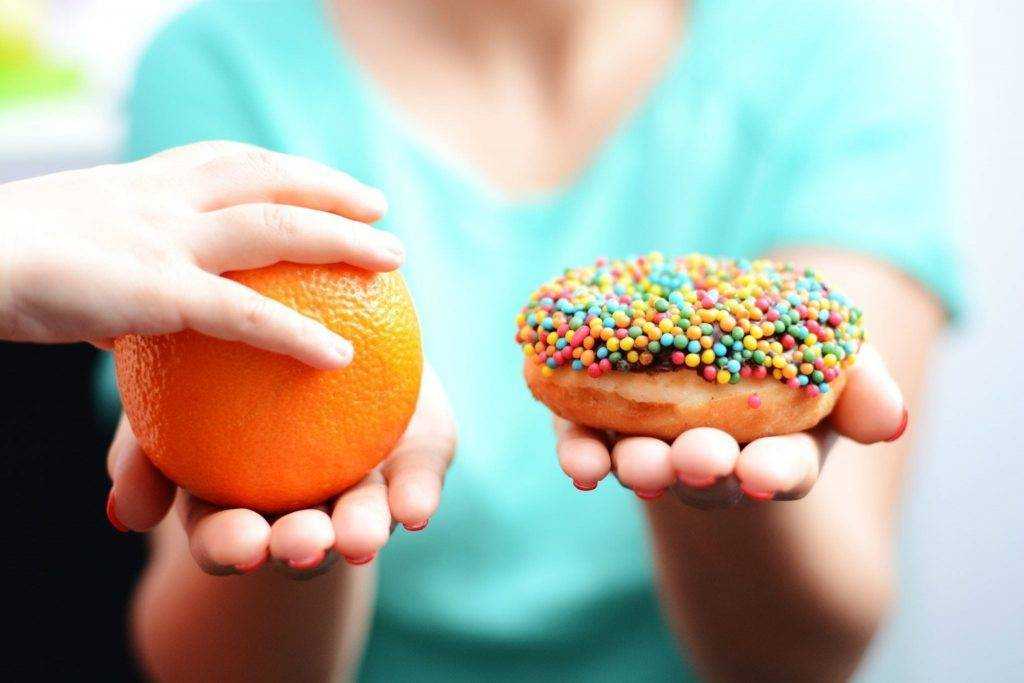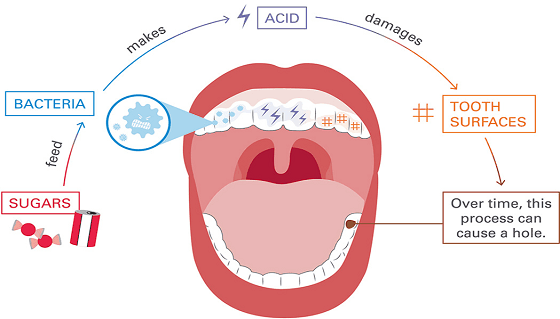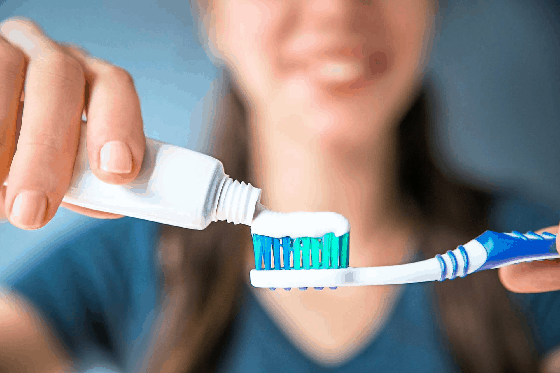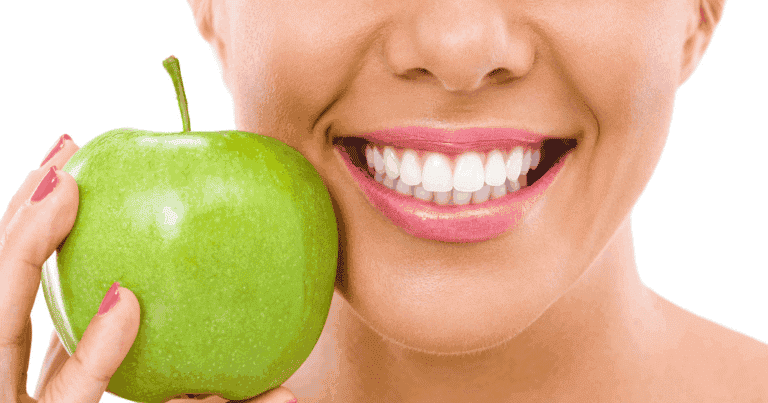Have you ever wondered why a few people have pearly white teeth? Why is it difficult for some people to maintain their good teeth though they follow good oral hygiene routine. A diet guide for healthy white teeth will solve all your queries about food and its reaction on your teeth.

Why is a healthy diet important for oral health?
Every time you eat or drink anything sugary, your teeth are under acid attack for up to one hour. This is because the sugar will react with saliva and bacteria in plaque (the sticky coating on your teeth) and produce harmful acids.
Acidic drinks can be harmful to your teeth. The acid wears away the enamel and will leave the dentine uncovered. This is known as dental erosion and makes your teeth sensitive.
A diet that is rich in nutrients such as vitamins, minerals, and fresh fruit and vegetables can help to prevent gum disease. The gum disease can lead to bad breath and ultimately tooth loss.
What is tooth decay?
Tooth decay damages your tooth structure and leads to fillings or even extractions. Cavity happens when sugar reacts with the bacteria in plaque. This forms the acids that attack the teeth and start to destroy the enamel. After a consistent attack, the tooth enamel may break down forming a hole or ‘cavity’ into the dentine. The tooth can then decay more quickly.
What foods can cause tooth decay?
All sugars can cause cavities. Sugar can come in many forms, for example, sucrose, fructose, maltose, and glucose. These sugars can damage your teeth. Many processed foods contain sugar. When you are reading the labels learn that ‘no added sugar’ does not necessarily mean that the product is sugar-free.
It simply means that no extra sugar has been added to the product. These products may contain sugars such as those listed above, or the sugars may be listed as carbohydrates. Ask your dentist if you aren’t sure.
How will acidic foods and drinks affect my teeth?
Some foods and drinks are more acidic than others, and some acids are enough to attack your teeth directly. The acidity of any food product is measured by its pH value.
It is always worth remembering that the lower the pH number; the more acidic the product. Anything with a pH value lower than 5.5 may lead to tooth erosion. ‘Alkalines’ have a high pH number and cancel out the acid effects. A pH value of 7 is the middle between acid and alkali.
Can I eat snacks?
It is better for your teeth and overall health if you eat 3 meals in a day and no more than two snacks, instead of having lots of snack attacks. If you do need a snack between meals, choose foods that do not have sugar. Fruit also contains acids, which can attack your teeth.
However, it will only harm your teeth if you eat an unusually large amount. Try to limit dried fruit as it is high in sugar and can stick to your teeth.
If you do eat fruits as a snack, try to eat something with alkaline such as cheese afterward. Savory snacks are better, such as:
- Raw vegetables
- Nuts
- Cheese
- Breadsticks
Can I eat sweets?
The main important thing to remember is that it’s not the amount of sugar you eat or drink, but how often you do it. Sweet foods are allowed, but it’s important to keep them to mealtimes.
To help reduce tooth decay, reduce how often you have sugary foods and drinks, and try to choose sugar-free varieties. Sweets and chewing gum that contains Xylitol may help reduce tooth decay. Sugary foods can also lead to or worsen a range of health problems including heart disease and being overweight.
What should I drink?
Water and milk are good choices. It is better for your teeth if you limit fruit juices just at mealtimes. If you drink between meals, try diluting them with water and rinsing your mouth with water after drinking. Drinking through a straw can help the drink go to the back of your mouth without touching your teeth.
Fizzy drinks can increase the risk of dental problems- if they contain sugar this can cause decay. The risk can increase when you have these drinks between meals.
Should I brush my teeth after every meal?
It is important that you brush for two minutes twice a day with a toothpaste containing fluoride. Ideally, it should be done before breakfast and last thing at night before you go to bed.

When you eat or drink foods it causes to weaken the enamel on your teeth, and brushing straight afterward can cause tiny particles of enamel to be brushed away. It is not good to brush your teeth until at least one hour after eating.
It is especially important to brush before bed. This is because the flow of saliva, which is your mouth’s own cleaning system, slows down during the night and this leaves your teeth more at risk from decay.
Children up to three years old can use a toothpaste with a fluoride level of at least 1000 ppm (parts per million).Three— year—olds to adults should use a toothpaste that contains 1350 ppm to 1500 ppm of fluoride.
What other products will help to prevent decay?
Sugar-free chewing gum helps to produce more saliva which cancels out the acid in your mouth after eating or drinking. It has been proven that using a sugar-free chewing gum after meals can help to prevent tooth decay.
References:
Expert opinion
Dr. Ankita Gada Dental Director of Sabka dentist, says “It is important to cut down how often you have sugary foods since it will limit the amount of time your teeth are at risk”.
Dr. Jena Shah Dental Director at Sabka Dentist says “Only using a good toothpaste does not ensure good oral health, it has to be supported with a good diet and a regular professional dental checkup at a dental clinic”.
Dr. Reena Waghela Dental Director of Sabka dentist says “It is important to use only sugar—free gum, as ordinary chewing gum contains sugar and therefore may damage your teeth”.










